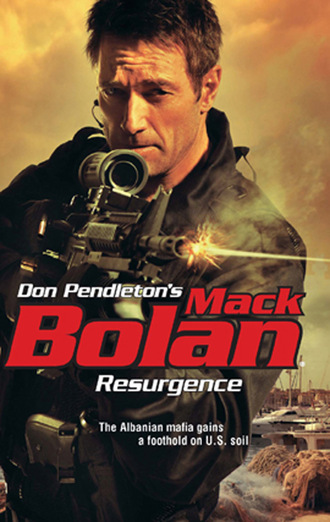
Полная версия
Resurgence

Human trafficking was a profitable business
Bolan watched as the slides showed girls and women being led from seedy rooms by uniformed police. Stretchers were used to carry out the ones who couldn’t walk, either because they had been drugged or their abused bodies had rebelled.
“Kurti answers to this man, back home,” Brognola said as the next slide revealed an older man.
“Rahim Berisha,” the big Fed said. “Think of him as Albania’s Teflon Don. He’s got the best friends money can buy on both sides of the law. He’s been indicted seven times, but something always goes off track at the Ministry of Justice—paperwork misfiled, warrants thrown out on technicalities, witnesses disappear. You get the picture.”
Bolan wished he could study that face through a sniper scope. “So the job would be…”
“Shut them down,” Brognola stated grimly. “Wipe them off the face of the earth.”
Mack Bolan®
Resurgence
Don Pendleton’s

There is no such thing in man’s nature as a settled and full resolve, either for good or evil, except in the moment of execution.
—Nathaniel Hawthorne 1804–1864
I guess that all depends on who you execute, and why.
—Mack Bolan
For Master-At-Arms Second Class Michael A. Monsoor
September 29, 2006 God keep
Contents
PROLOGUE
CHAPTER ONE
CHAPTER TWO
CHAPTER THREE
CHAPTER FOUR
CHAPTER FIVE
CHAPTER SIX
CHAPTER SEVEN
CHAPTER EIGHT
CHAPTER NINE
CHAPTER TEN
CHAPTER ELEVEN
CHAPTER TWELVE
CHAPTER THIRTEEN
CHAPTER FOURTEEN
CHAPTER FIFTEEN
CHAPTER SIXTEEN
CHAPTER SEVENTEEN
CHAPTER EIGHTEEN
CHAPTER NINETEEN
CHAPTER TWENTY
CHAPTER TWENTY-ONE
CHAPTER TWENTY-TWO
EPILOGUE
PROLOGUE
Off Cape May Point, New Jersey
“Could be a fishing trawler, sir,” Ensign Jared Decker said.
“Could be trouble,” Lieutenant Commander Julio Martinez replied as he tracked the target with his AN/PVS-14 monocular night-vision goggle.
Martinez and Decker occupied the bridge of the U.S. Coast Guard cutter Thresher, one of the eighty-seven-foot Marine Protector class vessels that were always named for aquatic predators.
The Thresher and its ten-member crew were on routine patrol from the Coast Guard’s Cape May Training Center, merging education with some practical experience. Their main targets were drug smugglers, but in the new world forged by 9/11’s flames they also had to watch for terrorists seeking a beachhead on American soil.
Three hours out from home, this might-be fishing trawler was their first suspicious contact.
“I can’t make out the name from here,” Martinez said.
“I couldn’t, either,” Decker answered.
“Better hail them, then, and see what’s up.”
“Yes, sir.”
He passed the order to the Thresher’s radio officer, seated no more than fifteen feet from their lieutenant commander. Decker had no doubt that Ensign Rachel Wells had copied the instruction, but Martinez demanded adherence to chain of command.
Wells gave him an “Aye, aye” and did her thing, trying to raise the trawler’s captain on a range of frequencies. No answer from the nameless target vessel, but they did get a response.
“It’s turning,” Martinez said, “and increasing speed.”
“Yes, sir!” Decker had trouble reining in his natural excitement.
“All hands to their duty stations,” the lieutenant commander ordered. “Run them down.”
“THEY’RE AFTER US,” Gjergj Cana observed.
“Of course. Are you surprised?” Masiela Dovolani asked.
“No. I just—”
“See to the cattle,” Dovolani ordered. “Keep them calm for now.”
Cana made no reply. There was no military discipline aboard the stolen boat, once known as the Adeline before its owner had been killed and dumped at sea, its name and registration numbers falsified and weathered artificial for maximum obscurity. But Cana didn’t hesitate when Dovolani told him what to do.
An act of insubordination could be fatal on this run-down pirate’s boat.
The “cattle” Dovolani spoke of was a group of twenty-seven frightened, hopeful men, women and children crammed belowdecks in a space that would have crowded half as many. Cana guessed they had fouled the head by now, as peasants will, but that was not his worry at the moment.
He was more concerned about survival.
Staying out of jail.
He scuttled to the hatch, a hunched shadow figure until he was pinned by the glare of a spotlight. Raising an arm to shield his eyes, Cana proceeded, wincing as a man’s amplified voice reached out for him across the water.
“Unknown vessel, stop your engines! This is the United States Coast Guard! Heave to and stand by for boarding!”
Not likely, he thought, and ran to the hatch. It opened easily enough, faint light below revealing troubled faces. Some of the women and children were crying.
“What’s wrong?” one of the grim-faced men called up to him.
Good question, Cana thought.
“The police are after us,” he told them, keeping it simple and watching their faces convulse. They didn’t have to know it was the armed forces chasing them.
“Keep quiet,” he added.
He had no real hope that any of them would be quiet, but Cana slammed the hatch shut before he faced any more questions.
Cattle shouldn’t speak in the first place.
The Coast Guard cutter hailed him once again on his run back to the wheelhouse. Cana braced himself for bullets, but they didn’t come.
“Well?” Dovolani challenged as Cana entered. “Did you quiet them?”
“They’re calm,” Cana said, “for now. Where can they go?”
“To hell, for all I care,” his boss replied. “This tub can’t hope to outrun that cutter.”
“So? What then?”
“We need a fire,” Dovolani said.
“What!”
“Just do it!” Dovolani snapped.
Cana opened a nearby drawer and grabbed a fat thermite grenade.
God help the cattle now.
“THEY’RE BURNING, sir!” The break in Decker’s voice embarrassed him.
“Burning and still running,” Lieutenant Commander Martinez said. “Stand by with the firefighting gear, but stay alert on those Fifties.”
“Aye, sir!”
Decker passed on the order via intercom, with no doubt in his mind that both gunners were ready for action behind their .50-caliber machine guns. Nervously, he dropped a hand to his right hip, where a SIG-Sauer P-229 R DAK semiauto pistol nestled in its tactical holster. Other members of the crew would be armed with M-16 A-2 assault rifles and Remington M 870 P 12-gauge shotguns, ready for boarding.
Assuming that the trawler didn’t burn up and sink before they could reach her.
“Is that someone going overboard?” Martinez asked.
“Can’t see them, sir,” Decker replied. “It might—”
There was no doubt then, in the next split second, as a human torch ran stumbling across the trawler’s rear deck, tripped and plunged over its side into the sea.
“Jesus!”
“Come on!” Martinez snapped. “Get up alongside!”
The helmsman was already taking action as Decker relayed the order, no standing on protocol now. The Thresher surged forward, gaining on the boat as it seemed to stall, wallowing in the Atlantic swells.
Gaining, for sure.
But Decker feared that they were already too late.
CHAPTER ONE
East Keansburg, New Jersey
The town was nondescript, one of a couple hundred on the Jersey shore that hadn’t grown notorious from sun-and-sleaze “reality” TV. It claimed three thousand residents and stood ten feet above sea level, with a public beach and small marina filled with cabin cruisers that aspired to being yachts when they grew up.
Mack Bolan wasn’t looking for a suntan or a sailing lesson as he traveled east on Seabreeze Boulevard, three hundred yards inland from Lower New York Bay. He was about to make a house call, crash a party that he hadn’t been invited to attend.
No problem there.
He’d done this kind of work before, more times than Bolan cared to count.
East Keansburg—alias “North Middletown,” according to the U.S. Census Bureau—wasn’t what the media would call a nest of crime. It covered half of one square mile and boasted 1,056 households with a median family income of sixty-one thousand dollars. Less than five percent of the town’s residents lived below the federal poverty line, and thirteen percent of those were senior citizens. Most of the problems handled by police were caused by minors, who comprised eighteen percent of the town’s population.
Overall, it was a pleasant place to live, where white males in particular found peace of mind between commutes to beehive offices in Newark, Staten Island or Manhattan. If it wasn’t Eden as described in holy writ, at least there were no serpents prominently on display.
It took a hunter’s eyes and nose to search them out.
Bolan would have bet his life that most East Keansburg residents had no inkling of evil dwelling in their midst, no clue that every salt-spray breath they drew was tainted by corruption of the foulest kind. What would they do if suddenly confronted with the truth? Consult the Monmouth County Sheriff’s Office or the state police? Email their congressman?
Or would they simply turn away?
Bolan was sparing them that choice today, absolving them of any duty to investigate, react or live with their decisions. He’d identified the problem—or, rather, a symptom of a larger problem—and was on his way to operate. When he was done, he’d cauterize the wound and move on.
His job wouldn’t be done, by any means. But it would be a start.
A message would be sent.
A block before Seabreeze Avenue ran out of pavement and changed into woods, Bolan turned south on Weehawken Avenue. The homes and lots got larger there, most of them ringed by trees that shaded swimming pools or tennis courts. Not mansions yet, but like the boats in the marina, they had aspirations. Failure hadn’t left its footprint here.
A quarter mile south of Seabreeze, Bolan turned east onto Port Monmouth Road and followed it out to the end of the line. When he could drive no farther without getting wet, he parked his rented Ford Mondeo Mk4 in a small sandy lot used by beach visitors, removed a pair of compact binoculars from the glove compartment and scoped out his target.
This house was a mansion, though not in the league of the Hollywood spreads. From studying the floor plans, Bolan knew that the home’s three stories above ground amounted to some twelve thousand square feet, with a finished basement adding another thousand. Upstairs, six bedrooms, each with an en suite bathroom. Downstairs, a parlor and living room, library, two dining rooms, plus a kitchen and pantry.
As for the basement…
There were no walled estates in East Keansburg, no gated compounds. The house Bolan had come to visit stood among trees, with no apparent guards or other defenses in place, but he knew that view was as deceptive as the mansion’s pristine paint job, hiding black soul-rot inside.
The sun was dipping westward out of sight, as he stepped out of the Ford and shut the door, then walked around to fish inside the spacious trunk. Already dressed for action in a slate-gray turtleneck, black jeans and hiking boots, Bolan removed his charcoal-colored blazer to reveal a shoulder rig supporting a Beretta 93-R pistol underneath his left armpit, with spare magazines for balance on the right.
The trunk gave up a MOLLE FLC vest and LBE web belt heavy with pouches for magazines, grenades and other combat accessories. The Modular Lightweight Load-carrying Equipment system, with its Fighting Load Carrier vest and permanently incorporated Load Bearing Equipment belt replaced the ALICE suspenders and belt worn by U.S. soldiers from Vietnam through Desert Storm. Even distribution of weight on a warrior’s shoulders and hips permitted transportation of extra arms and munitions, including the .44 Magnum Desert Eagle autoloader on Bolan’s right hip and the Mark 1 trench knife on his left. Hoisting an M-4 carbine from the trunk before he closed it, he was dressed to kill.
The Executioner turned toward his target in the dusk.
“YOU LIKE THE WHISKY?” Lorik Cako asked his guests.
One of the hard-faced men grunted, gulping his Dewar’s twelve-year-old scotch. The middle of the three men stared through Cako without answering. His stout companion on the left asked, “When’s the show start?”
“Soon, my friend,” Cako replied. “You have had time to see the catalog?”
“They all look good on paper,” the anxious one said. “Air-brushed and enhanced for all I know. We need to see them in the flesh. You get my drift?”
“And so you shall,” Cako assured him, keeping up the smile that yearned to spit and snarl. “A few more moments, while I make sure that our other guests are satisfied with the refreshments, eh?”
“Whatever. Make it quick.”
It galled Cako to deal with pigs, but he had done so all his life. Experience failed to make the process any more pleasant, but at least it was profitable. This night’s work would put money in his pocket. More important, it would enhance his standing with the men who mattered most.
The hard-faced men who had dismissed him came from Kansas City. Next in line for Cako’s personal attention were two Japanese and two Koreans, standing by themselves in Asian solidarity despite the centuries of animosity that had divided their respective homelands. Three of them were drinking Jameson Gold Reserve Irish whisky, while a fourth—the younger looking of the two Koreans—sipped Smirnoff blueberry vodka.
There was no accounting for taste.
“Gentlemen,” Cako said, “the revue will begin in just a few minutes.”
The four Asians nodded in unison. Any one of them might slit Cako’s throat for a two-dollar debt, but none would risk offending him with rude behavior in his own household. He left them nodding, life-size dashboard ornaments, and wished their courtesy would rub off on Americans.
Cako caught Vasil Majko’s eye across the room and raised a hand, five fingers spread. Majko lifted his chin instead of nodding and departed to prepare the merchandise while Cako kept on circulating, checking on his customers.
They always came in pairs, as if one man might be incapable of choosing products from the lineup. Or perhaps they simply liked the show. Two from Colombia, two more from Mexico, a quartet from the Middle East and two portly Nigerians.
None of their countries suffered any shortage when it came to women, yet they traveled from the corners of the world to bid on Cako’s merchandise. His auctions never failed to lure men of substance, brought together by their common lust and greed.
And why not, in a world where everything was for sale? There was no reason for a rich man to deny himself whatever pleased him, society and its ever-shifting conventions be damned.
Lorik Cako was a specialist in supplying illicit desires. The men he served appreciated his inventiveness and the completely ruthless way in which he dealt with opposition on the rare occasions when it surfaced.
He would be a superstar someday—was nearly there, in fact—and owed it to a total disregard for the well-being of his fellow man.
Or woman, as the case might be.
This night he had on offer twenty-seven females, ranging in age from sixteen to twenty years. Three were certified pure, and some of the rest barely used. All were lovely in different ways, something offered for every taste.
Blondes and redheads for the Third World market. More exotic specimens for the Americans and the Colombians. Sometimes Cako might take an order in advance, for a specific type—or a specific individual, the riskiest and most expensive service of them all. Whatever was demanded, Lorik Cako lived to please.
“My friends,” he said, raising his voice above the murmurs of his customers, “if you will follow me downstairs, we shall begin.”
They trailed after him like hungry dogs.
Like jackals closing on a wounded animal.
BOLAN APPROACHED the house from the southeast, cloaked by shadows as night descended on North Middletown. A Friday night, with locals starting to unwind, their working week behind them, ready to relax with friends or lovers, food or alcohol, and greet the weekend with a smile.
His targets, in the bid house, should be getting down to business anytime now. Bolan planned to interrupt them, cancel their festivities and send them home in body bags.
He owed it to the Universe. The very least that he could do, under the circumstances.
And a foot inside the door for things to come.
He knew the auction was beginning when the guards emerged to start their foot patrols around the grounds. Two men, both swarthy types with bodybuilder arms and torsos, armed with folding-stock Kalashnikovs on shoulder slings. They came out through a side door, separated and began to walk around the house in opposite directions.
Perfect.
Bolan slung his carbine, palming the Beretta with its sound suppressor attached. The 93-R was selective fire—its R was short for raffica, “burst” in Italian—and it packed a 20-round box magazine plus one 9 mm Parabellum mangler in the chamber. Firing 3-round bursts, using the pistol’s foldable foregrip, Bolan could take down seven men before he needed to reload.
One target at a time.
The first mark passed within twenty feet of Bolan, barely glancing toward the shadows where death waited to claim him. The soldier hissed between clenched teeth, bringing the guy around to face him out of curiosity, and stitched him with a rising burst from sternum to larynx. Toppling backward through a haze of crimson mist, the rifleman was dead before he hit the ground.
Bolan retrieved him, holstering his pistol and dragging the corpse by its ankles until it was swaddled in darkness. He could rush the house now, use the side door where the sentries had emerged, but that meant leaving one man with an AK at his back.
Unwise at best. Potential suicide at worst.
So Bolan waited, timed his second target by the time it ought to take for him to stroll around the house. And when he showed, coming around the northeast corner at an easy walk, the Executioner was waiting.
Ready for the kill.
The sentry faltered, visibly confused at failing to encounter his companion coming from the opposite direction. Slowing further as he neared the spot where they had separated moments earlier, he made a face and fiddled with the strap of his Kalashnikov, as if to slip it free.
Too late.
Bolan’s Beretta stuttered three more muffled rounds and dropped the lookout in his tracks. Unlike the other one, he fell facedown, his arms spread as if to hug the earth or mimic crucifixion.
The Executioner hauled the second corpse to join the first, leaving them side by side in shadow, fifty feet out from the house. He yanked the magazines from both AKs, tossed them as far into the night as possible and found no rounds in either rifle’s chamber.
Done.
The dead weren’t concealed to the extent that any passerby would overlook them, but there were no other strollers on the grounds just now.
Only the Executioner.
And it was time for him to move.
As far as he could tell, all windows with a view of his direct approach were curtained, but that didn’t mean he would pass unobserved. Surveillance cameras were so small and unobtrusive these days that they could be hidden in a tube of lipstick, pair of glasses or an artificial flower. Tucking one or more away beneath the eaves of a three-story house would be child’s play.
A risk, then, but he had to take it.
There was no way to complete his mission without entering the serpent’s lair.
Once he’d decided on the move, action immediately followed. Bolan ran across the open stretch of lawn to reach the door his first two kills had used, wearing his carbine slung and clutching the Beretta in his right hand, while he reached for the doorknob with his left.
Clasped it. Felt it turn.
So far, so good.
He opened the door and followed his pistol into a washroom of sorts. A big stainless-steel washer and dryer stood to one side, with open shelving on the other. Various household supplies that could be used to clean the place or whip up crude explosives with the proper know-how.
Smells and voices drew the soldier toward a kitchen, his index finger taut on the Beretta’s trigger as he left the laundry room behind and went in search of prey.
THE FIRST GIRL WAS ONSTAGE downstairs, a nearly naked figure, clothed only in a gossamer see-through wrap, lit by spotlights mounted on the basement’s ceiling while her audience—prospective buyers—lounged in three rows of well-padded theater seats, their part of the auction room darkened. Lorik Cako stood behind them, rocking on his heels with carpet underfoot, ready to answer any questions that arose.
The one he got most often, as the show progressed, was a request for samples of the merchandise. Cako always refused, good-naturedly, reminding his potential customers that they weren’t permitted to consume food in a supermarket without paying for it first.
A second question, asked almost as frequently, involved the younger specimens whom Cako certified as “pure.” How could he prove the claim that justified a higher asking price?
Cako was ready with detailed reports from Dr. Paul Koprulu, a gynecologist. Dr. Koprulu supplied full documentation, diagrams and photographs for each certified virgin, but customers were free to have their own physicians examine the products.
For a nonnegotiable price fixed by Lorik Cako.
Business was good. Cako controlled himself around the merchandise, maintained strict supervision over his employees and was merciless with anyone who soiled the goods. The last example he had made—nineteen-year-old Vasil Ghica, barely off the boat himself—would stick forever in the memories of each man Cako had compelled to view the young transgressor’s execution.
Ghica had spent six hours dying. For the first two, he had wept for mercy. In the last four, he had begged for death. Cako had made his other soldiers mop up afterward, to drive the lesson home.
Cako’s customers weren’t required to call out bids like peasant farmers at a cattle yard. Each seat was fitted with a button in its left armrest, opposite a molded plastic cup-holder attached on the right. A simple finger tap logged silent bids in Cako’s control room next door, where Qemal Hoxha monitored the bidding and reported each new bid to his boss through a tiny earpiece.
As each new specimen appeared on stage, Cako announced a rock-bottom reserve price, ranging from fifty thousand dollars to three times as much, depending on the item’s beauty and her purity, where applicable. He then declared each bid as it was logged anonymously from the audience. These women weren’t earmarked for seedy brothels staffed by groggy drug addicts. Thus far, not one had ever failed to sell above the base rate Cako had established.
Now and then, a nervous customer might bid mistakenly. Cako allowed retraction of the offer, but only if the clumsy customer announced his error to the group. Embarrassment prevented most from rectifying such mistakes, and in any case they were rich enough that five grand more or less meant nothing to them anyway.












